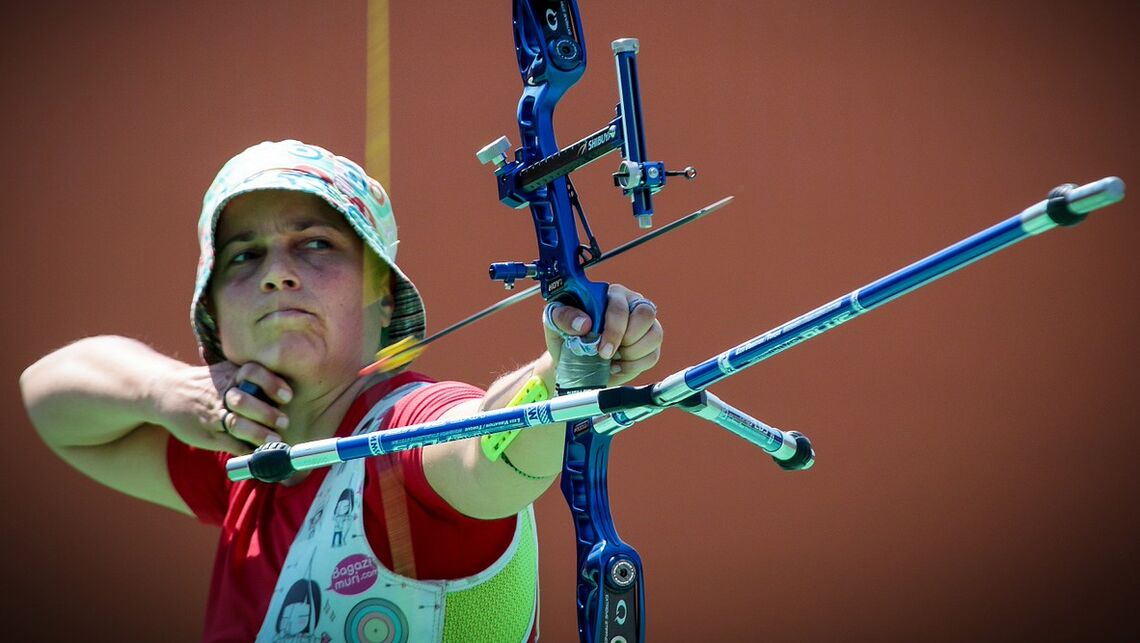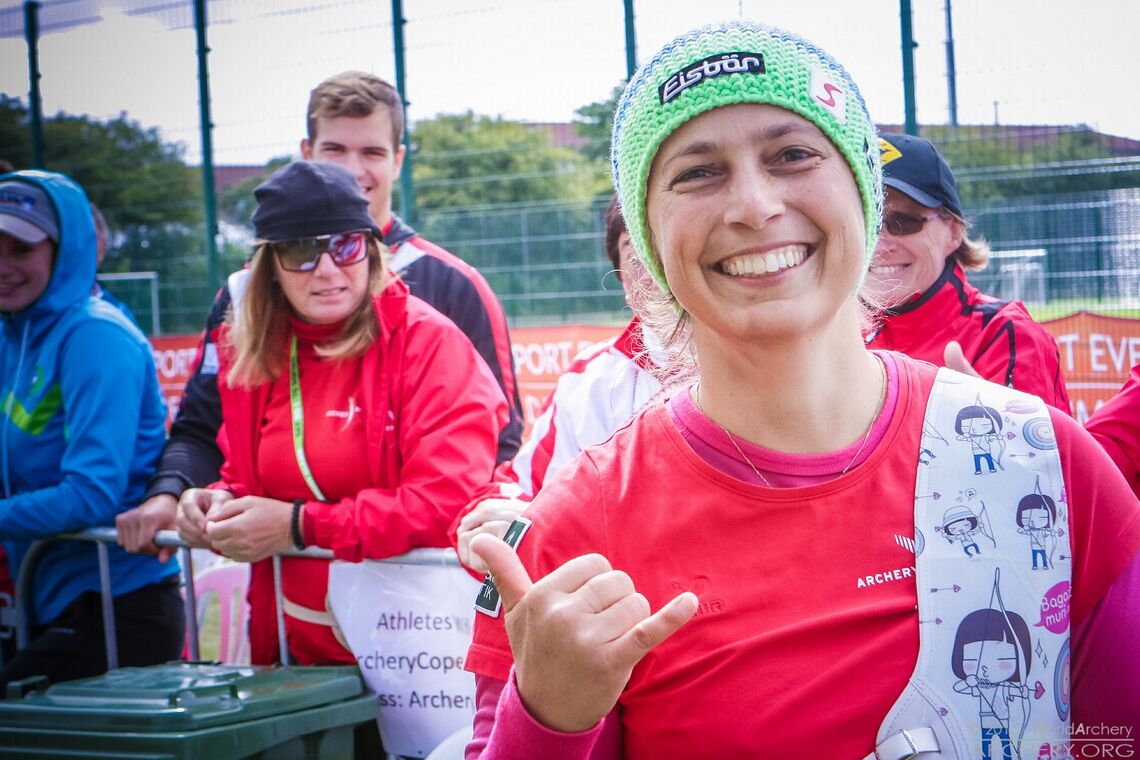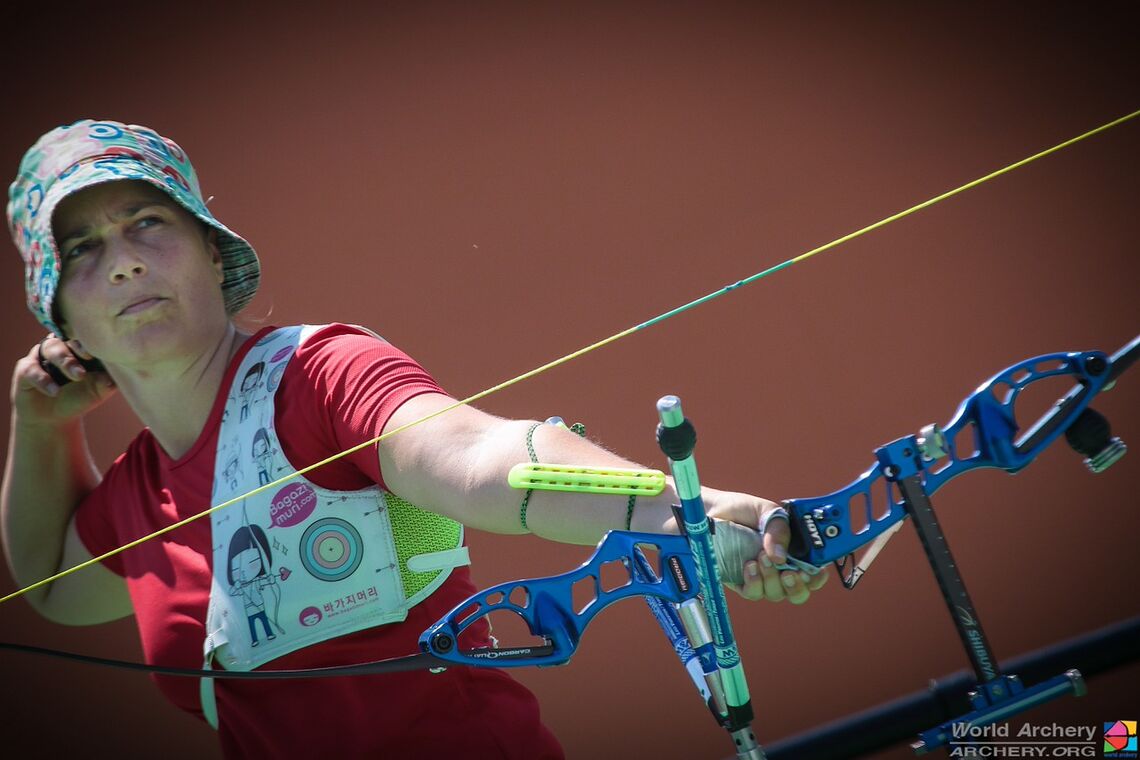Austria’s first Olympic qualifier: Laurence Baldauff

Laurence Baldauff started archery in 1990 and made her international debut at the World Archery Championships in 1993. After a nearly-10-year-long hiatus, Laurence resumed training in 2010, and has made appearances at four Archery World Cup stages since the start of 2014.
It was at the World Archery Championships in Copenhagen, the primary qualifier for the Rio 2016 Olympic Games, that the 41-year-old brought home her biggest achievement to date: A recurve women’s Olympic quota place. The first, qualified, in Austria’s archery history.
Having made it into the third round of competition at the worlds, Baldauff fell to Kaori Kawanaka, and missed out on a place in the primary tournament. She did, however, advance to the secondary quota tournament, along with five other archers that lost in the same phase – who would fight for three invitations to Rio 2016.
Laurence finished second out of the six, and took a place for Austria.
World Archery Reporter Katharina Dziacko had the chance to speak with Laurence about the quota place, her hopes for the Games and her archery life…
describe your journey through the qualifying tournament in Copenhagen for us…
LB: In my first match against Karyna Dziominskaya there was still the strong wind that had prevailed throughout the whole week. My coach, Samo Medved, gave me the right information at the right time and made me concentrate on good shots.
I was behind 0-4 when I was finally able to catch up and turn the match to my advantage. During all this time, I was very calm and I had to smile because my teammates encouraged me all the time. I had never experienced so many people cheering for me before. I definitely owe them a lot. It was great fun seeing them getting so excited.
In my second match against Karina Lipiarska, the semifinal, I continued to watch the effect the wind was having on the flags and I tried to shoot in between gusts of wind. However, this was not always possible, and in the last end my arrows were blown off course. Karina’s were, too, but mine scored slightly higher.
When I came back from scoring, I was congratulated by the entire Austrian team, waving the Austrian flag and cheering! With three quota spots available, and me into the top two, I’d secured a place. I had so many pictures taken and also got interviewed by an archery magazine.
My last match against Guendalina Sartori was very special because both of us were constantly smiling: The outcome was irrelevant! The wind had also weakened and become a little more predictable. I was leading 4-0 before Guendalina took over and won.
I was so happy that I’d managed to shoot the quota place – and a whole year ahead of the Olympics, which enables me to better plan my training for the coming months.

WHAT DID YOU THINK ABOUT COPENHAGEN AS A CITY?
LB: I liked Copenhagen from the start. There is a good combination of older buildings with lots of charm, like in Nyhavn, and extremely cool new constructions, like the opera house. I also loved the many water canals and bicycle lanes and the free spirit the Danes seem to have.
Austria last competed in archery at the Olympics before the qualification procedure was introduced, over three decades ago. How does it feel to be the athlete that changes that?
LB: Only three Austrian archers have ever participated in the Olympic Games: Oswald Probst at Montreal 1976, Peter Mitterer at Moscow 1980 and, in Los Angeles in 1984, Ursula Valenta.
Just days before the worlds in Copenhagen, Oswald Probst was involved in a tragic car accident and passed away. I’m sure he would have been very proud of the achievements of our team.
Since the quota system was introduced for archery at the Olympics in the 90s, no Austrian archer has been able to qualify, although my teammate Sabine Mayrhofer was close some years ago. I am very grateful for the opportunity now, and would be proud to represent Austria in Rio next year.
I’m also confident more members of my team will obtain quota places very soon.
Austrian archery is gathering momentum. We’ve never had so many young, talented archers motivating and challenging each other. The investment in time and energy in young athletes, which started years ago, is starting to yield excellent results. Alex Bertschler, Andreas Gstöttner and Dominik Irrasch, our young recurve men’s team (the latter two only juniors), have made extraordinary progress, and the next generation is already waiting in the wings.
Our archery federation made a smart move by hiring Samo Medved, our national coach, a couple of years ago. He has had a big impact and has changed a lot in a positive way. He believed in me and had me join the Rio squad, a team of five archers pushed by the federation to achieve.
If you make the trip to Rio, you’d be just the second Austrian recurve woman to do so – can you imagine how that might feel?
LB: It would, of course, be a great honour – but imagining being there conjures feelings of gratefulness, that my efforts, sacrifices and the hardships I endured were rewarded, happiness to have achieved this dream for the Austrian archery community, fulfillment of one of my dreams – which has been there for nearly as long as I can remember – thankfulness to my family, friends, coaches and team, without whom I would not have come this far, motivation and, most of all, excitement!
It would, after all, be my first Olympic Games!
What are your plans ahead of Rio?
LB: I intend to schedule the coming months wisely to make sure I am well prepared for the Olympics. I will work on my shooting and mental form and also improve my general fitness. My federation has planned some training camps for the coming months and I have some preparation tournaments.
What other goals do you have, as an archer and a person?
LB: Other than Rio 2016, I do not have any long or medium term archery goals for the moment. In my personal life, I would like to learn more about photography and travel for leisure.

Aside from Copenhagen, what do you consider your greatest achievements in archery?
LB: One of my absolute favourite moments was in 2014, when the Austrian field team, composed of Petra Goebel (compound), Reingild Linhart (barebow) and me (recurve), won gold at the team event of the World Archery Field Championships in Zagreb. We had worked a lot with our national field coach Christian Linhart prior to these Championships, but individually none of us made it to the semifinals. Our big day came in the elimination round of the team event, where we won successively against Germany, Great Britain and finally Sweden.
This World Champion title with the team means a lot to me because happiness was shared between all the team and created a special bond!
In light of the upcoming Olympic Games in Rio, the victory in Zagreb was certainly a motivation to also try my best at winning a quota place. When I succeeded in Copenhagen, it was a really happy moment in my life – but, of course, it didn’t just “happen”.
It was the result of a lot of hard work, disappointments, sacrifice and failure – and determination.
Considering the number of great archers and the limited number of quota places available in Copenhagen, I did not expect too much when I arrived in Denmark. My groupings were not as good as they were a couple of weeks before and the qualification round in Copenhagen did not go particularly well, either. Still, I kept believing it was possible.
My confidence grew when the first two elimination matches went well – but the defeat in the third round was tough. I went back to practise after my lost match. I guess this was crucial for the success in the secondary tournament.
How, and where, did you find your way into archery?
LB: I first tried archery in Luxembourg, where I originate from, while on a horse riding camp for young people. One day I was late, missed my group and the supervisor had to drive me to the stables. On our way, we stopped by the archery group and I got to try archery. I immediately loved it! Back home I went straight to the nearest archery club and joined.
In the beginning, archery was much less strenuous than horse riding or tennis, the two sports I had done before. Back then I did not expect that later, in order to improve my shooting, I would be back to tiring activities such as lifting weights, running and swimming.
I liked that there was no dependence on a partner or a horse – which had to be motivated – back then. When something was not right, I was the only one to blame. I learned to trust myself.
Over time, my archery club became my second family. I went there after school, when I did not have too much homework. My coach trusted me with the club key and all the responsibilities that came with it. Members worked together to improve the club and organise competitions, and always helped each other wherever possible.
In order to compete on the weekends, I had to make sure I had done most of my homework during the weekdays. I learned to plan ahead, paid more attention during classes and generally became more concentrated.
Archery helped me better my grades at school and boosted my self-confidence enormously.
How else Has archery affected your life?
LB: Archery taught me to set goals, make realistic plans, work hard, be persistent and most of the time, succeed. This also applies to other aspects in life. Priorities and interests may change, but the principles of success remain the same.

Do you prefer individual or team competitions, and why?
LB: My preference has changed over time. In the beginning I found team competitions more stressful because I felt an additional pressure. I did not want to be responsible for messing things up in the team.
Now, though, I see team competitions differently. I find them great fun. The encouragement within a team and from its supporters is a unique experience, and strong team partners always push each other to better results.
Shooting internationally means travelling internationally – how do you find that?
LB: Generally I love travelling very much. Although I have to admit that travelling for sports competitions is very different to travelling for fun. During a competition the most important thing is to stay focused on your objective and that means that the location becomes secondary.
At the same time, travelling for archery provides me with a glimpse of the environment, landscape and culture of the country I’m visiting. It makes it easier to decide whether to come back as a tourist or not. When travelling as a tourist, I generally prepare my trips in a completely different way: I learn about the history, politics, customs and touristic attractions of the country or city I want to visit.
Travelling to a competition means travelling for business, travelling for achievement.
What’s the difference between international and domestic competition?
LB: International competitions usually take longer because of the distances involved and there is a risk of lost or damaged baggage, and physical stress caused by different time zones. However, at international events the number of good archers is generally higher (South Korea may probably be an exception), which I find very motivating!
National competitions are much smaller events. There are less targets and archers, but many different bow and age categories, all on the same shooting line. At international competitions on the other hand, the variety lies in the number of nations participating.
I do prefer international competitions because of the higher standards and professionalism, and the opportunity of meeting archers from all nationalities.
Where has been your favourite place to visit so far?
LB: Every country I have visited has provided me with numerous positive impressions and widened my own horizons. Of course, I’ll remember places that are linked to successful competitions in a particularly positive way!










